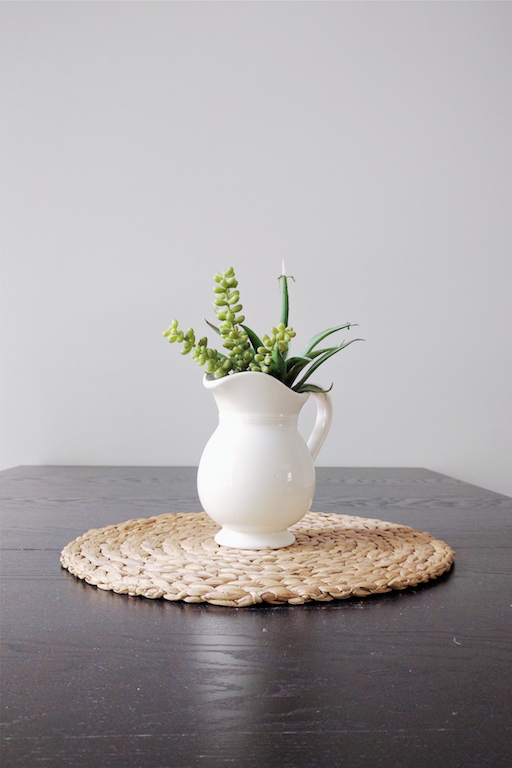Shopping Habits Of A Minimalist
Have you ever felt possessed by your possessions? I'm sure anyone who has made a significant move knows the feeling. You know, the one where you start packing boxes and going through drawers and storage while exclaiming under your breath, "Where did this even come from? How do I have so much stuff and not realize it?"
We all do it.
But it's a habit that can be broken and free you of the possession of possessions. For some, it may mean changing the way in which they shop - the topic I'm covering today. And what's better, it can not only free you of material excess, but of the excess found in financial burdens and excess of the heart. Minimalism has, more than anything, given me freedom.
What draws me to minimalism is the mantra of putting the simple joys in life above the things we surround ourselves with. It puts an emphasis on experiences or travel (read this) and creating an organized, manageable life (read this) so that you can give experiences or loved ones more of your time. Our things won't follow us when we pass on, but our lively natures, stories, and memories will be there for others to cherish. That's not to say that our things don't sometimes offer sentimental joys or make our lives easier by owning them... just that we should be choosy and realistic as to what is necessary, beautiful, or valuable.
As someone who used to spend a lot of my free-time shopping, this was a hard habit to break. A dress, a purse, a pair of earrings, shoe sales, hair products, a new throw blanket, decor I had no place for, and so on. I could never leave a store empty handed. Sound familiar? It was driving me into deep excess. Often times it was out social pressures. Of course when you're with your girlfriends and they tell you how amazing that dress looks on you, you've got to buy it! What's weird is that a lot of those items were hardly worn or used even once. In paring down, I've been shocked at how many items I've come across that barely saw the light of day.
When I graduated from college and was broker-than-broke, those habits came to a screeching halt. New priorities replaced them and I had to learn to manage my own finances. Somewhere along the way of living independently, getting married, and moving, we've embraced the minimalist lifestyle. Our purchases are well-thought out and always intentional.
Let me share how we shop, while still holding onto minimalism. Remember, it's not about owning nothing, it's about owning less.
1. Decide on what you want to purchase well in advance.
Leave your house with a plan or a list (and stick to it). Give yourself a price maximum and don't go above it. If you don't find the exact item you were on the hunt for, go home empty handed - it's better than hating the item two months down the road and not being able to return it. If you think you've found the right thing, maybe you need to take it home and try it for a day. Just be sure if it's wrong, you take it back ASAP.
2. The question of quality.
Will it last you a long time? Or is it made of cheap materials that will easily be ruined after short term use? This is one that personally differs to me. I tend to take very good care of even my cheapest items and they last a long time. If I like the look and price, but the quality isn't great, it's usually not enough to scare me off. However, for others, buying higher quality items may be very important.
3. Is it necessary?
Seriously. Is it? Do you need it? Will you use it once and then shove it into a dark corner? This is the main question I almost always answer 'no' to, and end up putting it back. This is also the main question that causes me to leave a store empty handed... and it feels good!
4. Is it replacing something I no longer have, or am planning to throw out?
Did you break your corkscrew and legitimately need a new one? Then go for it.
Do you have a set of old dish towels that you want to replace? If you buy a new set, remember to actually toss the old ones. Empty promises add to the cause of excess.
5. How does this add to my life or improve the life of my family?
Will it make a daily task more efficient? A new microwave, for example. Is your old one barely getting the job done? Perhaps a new one would cut down on cook times or be safer to use.
6. Do I already own a version of this that works just fine?
Like that corkscrew I mentioned before. Do you have one that works, but you like the new version better? Why would you need two working corkscrews? If you can part with the old one, then perhaps the new one will serve you better.
7. Is it decorative, functional, or needed?
Are you buying it for the sake of buying it?
ie. it's on super sale, it's really cute, it's funny, it made you think of someone, it seems unique, it might come in handy, etc...
The problem with many of those phrases is that they're justifying. Guys, we can all justify a purchase 12 times over. That doesn't mean it really will fill a decoration void, or a function, or a need. And if your purchase will financially or personally take away from the well-being of your family, I would hope you'd have the strength to say no. Simple as that.
8. Will I love this in a month, a year, ten years?
It's not super likely that you'll love the same wall art for thirty years, but if you think you'll be tired of it by the year's end, maybe it's not right. If you do tire of it, will you sell/donate it, or store it until one day you might like it again (hint: if you don't like it now, you won't like it ten years from now - toss it!)
Currently, we're looking at new bed frames. I want something I'll love forever, but the reality is, styles change. This is one reason I tend to buy very inexpensive pieces. I'm not buying it to last for decades, I'm just buying it to serve a purpose for about five to ten years. Then, I'll donate a well-cared for frame to someone who may really need it, and update my style.
9. Is it easy to clean?
Maybe this isn't for everyone, but as a clean-freak, it's a question I often raise. Dry-clean only? Probably not for me. Too many crevices to dust? Pass.
Being able to deep clean my house quickly and efficiently is important to me, and owning too many items will slow that down or make the process frustrating. If my 'stuff' is hindering my cleanliness or organization, it's time to pare down.
10. How does this simplify my life?
The biggest question of all.
If you are aiming for a minimalist home that encourages simple living, does this item add to the noise and take away from what you really find important? What's important is defined by you and your beliefs. There's not a one-size-fits-all mentality to minimalism. Give yourself a clear definition and stick to it!
Hopefully this post offered some insight into shopping like a minimalist. Some will do it differently, but to me, these questions are reminders of the purpose my 'things' should play in my life. It can be hard to stick to when living in a world where excess is praised and encouraged, but it has been one of the most rewarding challenges I have ever taken on.






